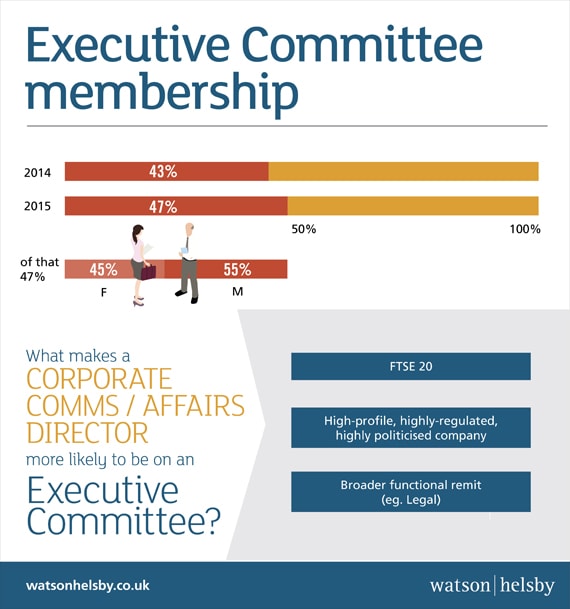 As more firms recognise the true value of their reputations, they realise they need the expert advice of comms professionals in the boardroom. This is backed up by the findings of the 2015/2016 FTSE 100 Group Corporate Communications/Affairs Survey by communications and corporate affairs recruitment firm Watson Helsby.
As more firms recognise the true value of their reputations, they realise they need the expert advice of comms professionals in the boardroom. This is backed up by the findings of the 2015/2016 FTSE 100 Group Corporate Communications/Affairs Survey by communications and corporate affairs recruitment firm Watson Helsby.
Nick Helsby, founding director of Watson Helsby, lists a key finding: “Looking at the status and perceived value of the communications role within the FTSE 100, a key indicator that this is on an upward trajectory is membership of the executive committee, which increased from 43% in 2014/2015 to 47% in the 2015/2016 Survey.”

Helsby lists three reasons why this trend is likely to continue:
- “Executive teams tend to be introspective and not naturally inclined to factor in the external environment when making investment decisions and commercial choices. Yet most of the key strategic decisions that a company makes, be they investment related or about the direction of the company, need to be informed by, and factor in, the external world, particularly stakeholder sentiment and expectations, political and regulatory issues, etc. But this external world is complex and difficult to understand and navigate in a sure-footed manner. There increasingly needs to be someone present at ExCo meetings who is able to make sense of the issues and themes, and with the support of robust data, research and analysis, synthesise them in a way that is meaningful and that will make a valuable contribution to strategic and decision making. In other words the presence of the corporate affairs director on the ExCo can lead to better decisions.
- “It is prudent to have someone on the ExCo, with an understanding of how the company is perceived by external (and internal) audiences, to act as a check and balance, ensuring the company remains cogniscent of its values, behaviours and aware of how it looks to the outside world; and, when necessary, making sure that questions such as ‘what might a certain course of action do to our reputation?’ and ‘should we be doing this, given that we have previously said this?’ get tabled and debated. The director of communications/corporate affairs is best positioned to be this voice (however unwelcome it may be), because they are more sensitized to the potential reputational implications of certain decisions and actions and how they may play out and land. They are better able to see how these may damage reputation and erode trust (the ‘you say one thing, but do another’ syndrome).
- “If a company wants to be seen as authentic, all stakeholders’ experiences of the company concerned needs to be broadly consistent, whether it is cross-functional, across business divisions or across geographies. This will not happen of its own accord, so someone at a senior level has to take oversight of this. Someone also needs to ‘operationalise’ reputation management. The corporate communications/affairs director is the most obvious choice for this ‘role’, but they need the authority to make this happen and they need to be seen as a peer to the regional/business unit leaders. They therefore need to be on the ExCo.”
Helsby concludes: “For most companies in the FTSE 100, and beyond, reputation is a key strategic asset that needs to be both protected and leveraged. It is a source of competitive edge but if it is not ‘represented’ at ExCo level, a company may take decisions and miss opportunities that could cost it dearly.”
Background
Watson Helsby’s latest 2015/2016 FTSE 100 Group Corporate Communications/Affairs Survey collected data on over 90% of the FTSE 100, using a combination of proprietary data, desk research, online questionnaires and telephone interviews. The company also used its contacts with many of the FTSE 100 corporate communications/affairs directors to gather data.
PR Masterclass: The Intersection of PR and GEO
Join PRmoment for a Masterclass featuring 10 of the industry’s foremost experts. You will walk away with a clear, actionable strategy for adapting your content to an AI-first search environment.
Taking place on Wednesday 25th February in London, both virtual and in person tickets are available.
Early bird ticket sale ends Friday 9 January.
PR MasterclassIf you enjoyed this article, sign up for free to our twice weekly editorial alert.
We have six email alerts in total - covering ESG, internal comms, PR jobs and events. Enter your email address below to find out more:









